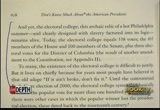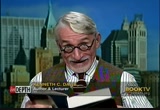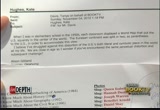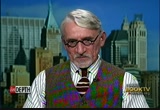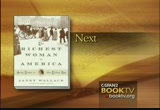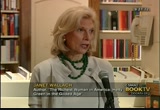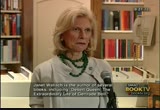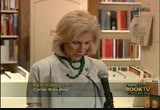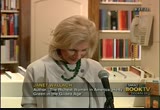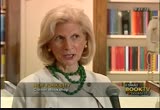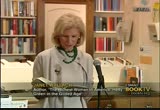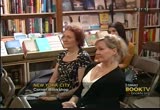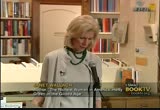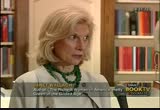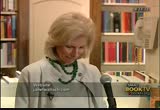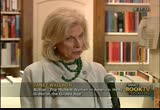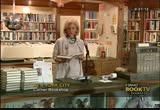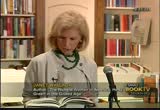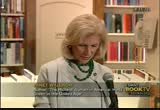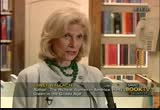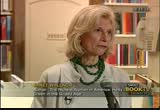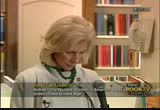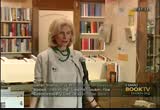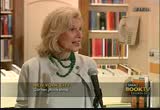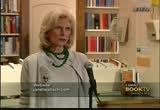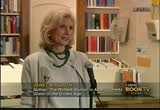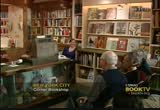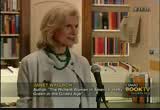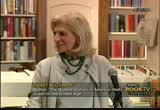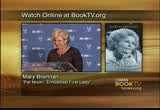tv Book TV CSPAN November 23, 2012 11:00pm-11:30pm EST
11:00 pm
slavery factored into its logic remains alive. today it equals 538 votes to of 445 members of the house and 100 members of the senate plus three el toro votes for the district. and promises of reform or a constitutional amendment to do away with the electoral college have always met with serious resistance, especially from states and politicians who benefit from the system and attempt to amend the constitution and abolish the electoral college, replacing it with direct election of the president was killed in the senate in 1979, but the issue rears its head every four years when people look around and wonder why america needs this antiquated contraption. and, unfortunately, i was looking in here for the name of the book. two people have no ask you. what about posting that on your website? >> if you don't mind my looking
11:01 pm
i can look in -- i think i have my book right here. perhaps i can come up with it. i believe it is called, how democratic is the american constitution? the author is a yale scholar, and i think, you know, i am under tv lights for too long. my brain is not coming up as something of a measly much better producing. >> host: okay. we are almost out of time anyway. if i give you 30 seconds to answer this question, and that's not very fair. there was an e-mail here that i wanted to finish with. and unfortunately, no i have put it under one of your books. i haven't read here. this is from allison in norman, oklahoma. when i was in elementary school in the 1950's, each classroom displayed a world map that put the u.s. squarely in the center of the world. the eurasian continent was split
11:02 pm
into, as parentheses to the u.s. in order to accommodate this you. i believe i have struggled against this distortion of the u.s. is both literal and symbolic place in the world all my life. we are close in age. so i wonder if you encounter the same perpetual distortion and subsequent challenge? you have 30 seconds. >> absolutely something i write about in don't know much about geography. specifically, most of us grew up with a certain, what is called, projection of the world. greenland looks like it is big, if up in africa. so, as things get turned around and given proportionally, i also included in that book of maps that just turns north and south america upside-down. what would happen if we looked at -- there's no reason we can look at it that way. north doesn't have to be a top. we could put south of the top who wanted to. >> host: we will have to leave it there. i apologize.
11:03 pm
11:04 pm
11:05 pm
11:06 pm
massachusetts to a classic family of merchants. in those days, will merchants fueled the houses and factories not only here, but around the world. and they were used for perfume and paint and buggy whips and just about everything in between. so her family was extremely classic and they lived in what new bedford was, the most prosperous town in america. they seemed like they embodied american values. they were hard-working and they were upstanding citizens. her father supported abraham lincoln later on. and they were spiritual and quakers. and they have had the new england values from the quaker values of thrift to the point of
11:07 pm
stinginess, particularly her father, and they have believed in simplicity and clean living. to them, to the quakers, wealth was a sign of virtue and god's blessing. so they were very blessed. except that her father really wanted to sign. when his first child was born, it was a girl. it was hetty green. and he became enraged. so much so that her mother took to the bed and hetty was sent to live with her grandfather and her mother sister, her aunt. she knew that the only way to gain her father's love was to earn her because her father was
11:08 pm
obsessed with money. he said so himself. her grandfather taught her to read the newspapers and business news and the stock and bonds in the newspapers, which, she was a little girl. as soon as she could read. at the age of eight years old, she opened her own account of the savings bank in town. then she was sent off to a quaker boarding school, where again, she was taught about risk and taught about what to eat and how she should eat what was put before her. she did not either, she will be served at until it was gone. she was taught to respect the girls in her class. with her tuition, it was paying for those of the poor girls. and the strange way of her family, she was sent to a fancy
11:09 pm
finishing school in boston. were she was taught to dance well and to become a witty conversationalist and a striking young woman. in 1864, she had her debut in new york. and she came back here a few years later. nothing could outdo the flurry of excitement when she returned to new york in the fall of 1860. the city shimmered with news that the prince of wales was coming to visit. in his honor, a group of leading citizens was organizing a ball. society than was very excited. excited couples who had paid $10 apiece arrive at the academy of
11:10 pm
music. women curl their hair and they had special nods to acquaintances and friends. precisely at 10:00 p.m., they prayed and sang god save the queen and the slight friends stepped into the room. for two hours, nearly 3000 of new york's finest citizens rushed like schoolgirls to meet him. in a mad crush, the wooden floor collapsed. the band played furiously. the guests rushed to follow and they piled their plates with lobster salad, and filled their
11:11 pm
glasses with champagne. at 2:00 a.m., the dance floor shift. eager females, young and old, waited their turn for a waltz or a polka and finally the young woman was there. her arms were covered in long white gloves. hetty was introduced to his highness, the prince of wales. >> i am the princess of wales, she replied. [laughter] you are proof of that, said the prince, and he sailed her away on the dance floor. well, it wasn't a prince who courted her. it was edward green, who is over
11:12 pm
6 feet tall and over 200 pounds in weight. he was a self-made millionaire. he asked hetty to marry him, and her father agreed to it. on one condition. that edwards sign a prenup that they would live on edwards money and hetty's money would be hers to protect and to increase and to pass onto the next generation. shortly after that, her father die. remember, this was 1865. $5 million to put in a trust for her, which she had expected to be able to control their own money. two weeks later, her spinster aunt died. hetty was the only heir to the family wealth. and they agreed to a well in
11:13 pm
which she would leave all of her money, $2 million to hetty. but instead she left half to the town of new bedford, and the other half to the community. she put it in a trust. so hetty suit her. the lawsuit went on for years. it became a landmark case and hetty became involved with. in the days of the booming railroad, he diesel bonds to european investors. hetty had two children, a son and a daughter. she invested her money in railroad bonds and she boasted that in one day, she made
11:14 pm
$200,000. europe was booming. banks were loaning money at low interest rates. real estate prices were rising. and investors were buying bonds because they were paying high interest rates. the prices became so high that they had reached a level where no one can afford could afford them anymore. no one can pay those prices. so the market started crawling. they couldn't buy the bonds and they started selling them. 80% of american railroad bonds were owned by europeans. one of the great american railroads went into bankruptcy, and the bank that was fun and had to close.
11:15 pm
there were no more customers with the railroad bonds and heavy and edward had to come back to america. and they came back to new york. the city had 10 story buildings on the horizon in central park stretched as far as 80th street. apartment houses appeared the first time. the metropolitan museum of art opened, and so to this museum of natural history. the exuberant spending that had once worn effect of new york was no different from the unfettered expansion fed by industrial entrepreneurs, promoters, and real estate speculators in the
11:16 pm
midwest and in the west. by the order of 1873, the financial panic had pricked bubble of hope and flattened the country into despair. does that sound familiar? new york jitters as stocks bounced up and down. they worst by their loss as it is they held on to their tall hats and worried over their jobs. shortly after hetty arrived, she rode downtown to see her banker. she made her way along the route of america's richest past the
11:17 pm
custom house and passed the doors of 59 wall street. and she entered the office of her father and husband. he made their services available for her wall street business. at this time, when stocks were being abandoned, hetty wanted to trade. i believe in getting in at the bottom and out of the top, she said. when i see a good thing going cheap because nobody wants it, i buy a lot of it and took it away. this offered an opportunity for the future. she invested and her husband
11:18 pm
gambled. at one point he crossed the red line when he was her money as collateral with bad risks. when she had to pay for his mistakes, she sent him packing. she was a single working mother with two children. at the time, there were constant articles about how inferior women were end about how internet women were with money and how innately impossible it was for them to invest. there were also a constant articles about how she was mean and how she was a terrible mother. in the true new england and quaker style, she watched her pennies. to an extreme. she lived in boarding houses and plain apartments.
11:19 pm
she dressed in old clothes and ate simply. but she taught her son and daughter as much a secret about business. she believed that girls should know about business and finance and at the very least, they would lead better lives. she thought she should also know about having careers, even if they didn't think they needed one. she believed that women should be equal of any man. but for the next 25 years, america had its ups and downs and there were rooms and in 1893, there was a bust. after a long recession, it was a great boom. in 1907, there was a great bust. every time it happened, it was caused by greed and ego's and over lending and overspending. as warren buffett said recently,
11:20 pm
a climate of fear is an investor's best friend. had he was free and courageous and she always kept a cool head. she worked hard and did her homework and she knew her company. when everyone jumped overboard, she climbed in and grab the oars. when everyone was rushing, she clambered off the bow. it took courage, but she bought when everyone was selling and she sold when everyone was buying. by the time she died, she own houses and office buildings and big blocks from vermont to new york and illinois to missouri and texas to california.
11:21 pm
she helped out banks when times were bad and they were in trouble. she was the largest individual lender to the new york city government. she lived in the gilded age when society lived lavishly and she rebelled against their opulence. she lived a simple life. she loved her children and her friends. she was of those who befriended her for her money and she showed her dog great affection and when asked why, she said -- [inaudible] [laughter] she forged a path for women to be able to have careers. she showed that women were the equal of any man. newspapers around the world, they proclaimed her the queen of wall street. it was known throughout that she
11:22 pm
was the richest woman in america. so there are lots of sayings in the back of the book and words of wisdom. she did have a good sense of humor and she was one smart lady. if you have any questions, i would love to try and answer. >> would you find any evidence of her support? >> nine. she said women should not have the right to vote. margaret thatcher did leave and not either. vera can't even believe in it. it's interesting. it's like they would want to make their way in america. or they feel that women should be doing it on their own.
11:23 pm
>> i hate to generalize, but i think that women are their own worst enemies. when you get into situations where you need mentoring for help to get through a barrier, women like to keep it that way. >> that's correct. >> and i think they like being successful in a man's world. >> she was so famous in her day the ever popular songs about her and plays written about her and she was in the newspapers at least once a week and often more. she had two children, as i
11:24 pm
mentioned, but no grandchildren. there were no more tears. so her name kind of disappeared. there were no buildings named after her, no great institution. her name. and i think that is why it happened. but i have met people who have heard of her and whose parents may have said, oh, don't be like her work pleased to be like her. [laughter] >> would happen to her wealth? >> well, he went to her son and daughter. and then when they died, it was distributed amongst hundreds of heirs. that was the original clan. if there were no errors, that it would go to distant cousins who didn't even know they were related to her. her name was hetty howland
11:25 pm
robinson. >> so her children were not famous in any way? >> her son was well known. she asked him to buy a small branch of a railroad in texas in the 1890s. and he turned it into the most successful small railroad. then he did a number of things. he went back to new bedford and built a brand-new house on the family property and turned it into a center for radio technology and meteorology and gave it to the united states government during world war ii. he had one of the greatest collections of coins and stamps. he really did make a mark. >> yes?
11:26 pm
>> one of the things that strikes me about the gilded age and well, there were a lot of wealthy people who believed in giving back to society, particularly someone like andrew carnegie. did she donate any of her money to public service? >> she never did it publicly. and she would dismiss any suggestion that she had. but her son said and others have said that there were plenty of places that she gave to were people that she gave two. she said that she was hounded for her money. she was constantly getting letters beseeching her. so she tried to keep it as quiet as possible. and there is no proof. but because other people said it at the time. she had a very close friend who lived in the neighborhood with her. he was a great catholic
11:27 pm
philanthropists and that is how generous she was. >> how hard was that to research? >> it was difficult because there were no diaries or journals. she didn't want any trace of her signature. she was accused in the lawsuit -- accused of forging her aunt's signature. so she was always afraid that someone would forge your signature. so there was very little to go on. what i did read was in newspapers, there were constant stories about her in the newspapers and interviews. most of the headlines were really negative. but the reporters spend time with her very much appreciated
11:28 pm
her and admired her and enjoy her company. so that was very rewarding to see that. the story was syndicated all over the united states and all over the world. >> how long? >> about five years. >> thank you so much. [applause] >> for more information, visit the author's website, janet wallach.com. >> i would like to begin with the story. one evening in 1954 at a dinner in which eisenhower was going to eat, and indian woman sitting outside the event of bench of a banquet hall thought that she
11:29 pm
recognized a woman. and he said, no, and they continue down the stairs. halfway down, can't remember the woman and a return where the woman was sitting. they asked that they had not met previously. when the woman decide that they had, it was inquired what she was doing in the hallway. the woman explained that she was returning to india in a few days and was hoping to catch a glance of the president before she went home. she then arrange for the woman to be given a speech after dinner so that she could hear the speech as well as see the president. nixon then left the hall to continue on to previous engagement. i use this the story to begin my top because i think several key points i wish to make about pat nixon and her public role. more particularly about her role as a foreign diploma
112 Views
IN COLLECTIONS
CSPAN2 Television Archive
Television Archive  Television Archive News Search Service
Television Archive News Search Service 
Uploaded by TV Archive on

 Live Music Archive
Live Music Archive Librivox Free Audio
Librivox Free Audio Metropolitan Museum
Metropolitan Museum Cleveland Museum of Art
Cleveland Museum of Art Internet Arcade
Internet Arcade Console Living Room
Console Living Room Books to Borrow
Books to Borrow Open Library
Open Library TV News
TV News Understanding 9/11
Understanding 9/11